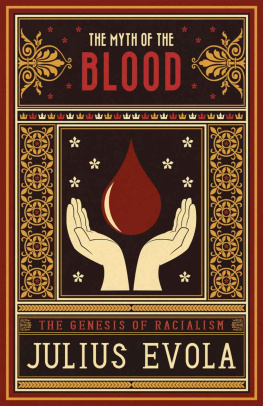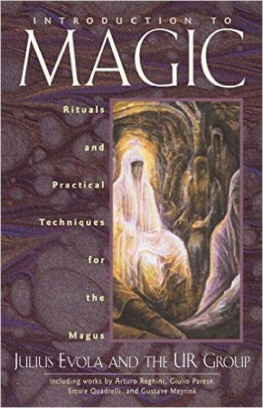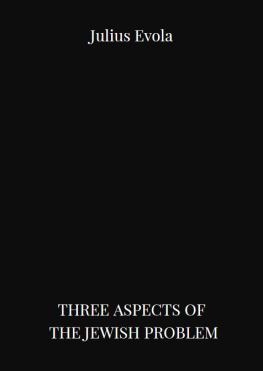Fascism Viewed from the Right
Original: Il fascismo visto dalla destra; Note sul terzo Reich,
Rome: G. Volpe, 1974.
First English edition published in 2013 by Arktos Media Ltd.
Copyright 2013 by Arktos Media Ltd.
All rights reserved. No part of this book may be reproduced or utilised in any form or by any means (whether electronic or mechanical), including photocopying, recording or by any information storage and retrieval system, without permission in writing from the publisher.
ISBN 978-1-907166-85-3
Translation: E. Christian Kopff
Editor: John B. Morgan
Cover Design: Andreas Nilsson
Layout: Daniel Friberg
ARKTOS MEDIA LTD
www.arktos.com
Fascism Viewed from the Right
by Julius Evola
Translated with an Introduction by E. Christian Kopff
ARKTOS
LONDON 2013
A Note from the Editor
The footnotes to the Introduction were added by E. Christian Kopff. The footnotes to the text itself were added by me. The second Italian edition of this work contained a number of footnotes added by Evola himself. To avoid confusion, these have been included as part of the main body of the text, but are bracketed and indicated to make it clear that they are notes.
Where sources in other languages have been cited, I have attempted to replace them with existing English-language editions. Citations to works for which I could locate no translation are retained in their original language. Web site addresses for on-line sources were verified as accurate and available during December 2012.
I would like to thank Professor E. Christian Kopff for his work on this volume and for his dedication to ensuring that it has been held to the highest quality standards possible. This book would not have been realised without his extraordinary and generous efforts.
JOHN B. MORGAN IV
Introduction
By the early 1960s, Julius Evola (1899-1974) felt he had written his most important books, Revolt Against the Modern World,
Evola had a variegated career. In his youth, he was the major Italian Dadaist poet and painter (1916-1922). He then became the leading Italian exponent of the intellectually rigorous esotericism of Ren Gunon (1886-1951). He enjoyed an international reputation for books on magic, alchemy and Eastern religious traditions, winning the respect of such important scholars as Mircea Eliade and Giuseppe Tucci. In his lifetime, only one of his many books, The Doctrine of Awakening, a 1943 interpretation of early Buddhism, was published in an English translation (1951).
In Europe, Evola is known not only as an esotericist, but also as a brilliant and incisive Right-wing thinker. During the 1980s, his traditionalist and political books were translated into French. The essay by Gnosis editor Jay Kinney is devoted to Evolas Fascism. He seems not to have read Evolas books in any language, called The Metaphysics of Sex
Evolas only book translated into English and concluded that Evolas esotericism appears to be well outside of the main currents of Western tradition. It remains to be seen whether his Hermetic virtues can be disentangled from his political sins. Meanwhile, he serves as a persuasive argument for the separation of esoteric Church and State.
Evola was never a member of the Fascist Party, and during the two decades when Mussolini ruled Italy, Evola published critiques of several distinctive Fascist initiatives, including the Concordat with the Vatican, the violence of Fascist toughs ( gli squadristi) and Fascist rapprochement with National Socialist views of race. His opposition to the Concordat did not convince Mussolini, who was, however, sufficiently impressed by Evolas critique of scientific racism to give his imprimatur to a German translation of one of his books on race, Synthesis of the Doctrine of Race.
Evolas originality lay in his thorough and consistent traditionalism, beginning with this books witty title. Some Italians defended Fascism and all its works and ways from the March on Rome in October 1922 to Mussolinis resignation on 25 July 1943 il Ventennio , or the Twenty Years. Their motto was Il Duce ha sempre ragione! (The Duce is always right!). Others, committed Leftists and less committed compromisers, denied any virtue to Italys government of that time. In Fascism Viewed from the Right , Evola points out the absurdity of both positions and proceeds to a critical analysis of Fascism on the basis of the principles he had expounded and advocated in Revolt Against the Modern World and other books and pamphlets. Evola is interested in Fascisms principles. He insists that human failings and historical accidents (what Evola refers to as the contingent) should not be held against men or movements unless they can be shown to be the consequences of mistaken principles.
Evola seeks the principles of Fascism in Mussolinis major speeches and initiatives, as well as the article on The Doctrine of Fascism in the Enciclopedia Italiana. (This last was officially the work of Mussolini, but is usually attributed to the regimes major philosopher and educational reformer, Giovanni Gentile.)
Evola finds that Fascisms principles were often good. The regime was sound in principle but failed during the crisis of the Second World War because Italians had been demoralised by two generations of liberal and radical propaganda since the uniting of Italy, il Risorgimento. (For the Left, the Risorgimento was the expulsion of foreign and papal rule from Italy by an aroused Italian people who were led by great republican radicals like Garibaldi and Mazzini. Conservatives thought that Victor Emmanuel (Vittorio Emanuele), the King of Piedmont, and his politically astute advisor, Cavour, used Garibaldi and Mazzini to overthrow Italys traditional regimes, which were replaced with Piedmonts bogus because politically incoherent constitutional monarchy.)
Evola explains the principles of a true Right. A strong central state creates a nation and its people, not vice versa. At the moral and political centre of the best states is a king ( rex), who may, however and under Fascism did choose a leader ( dux) to administer the state. Strong central leadership does not subvert and, in fact, encourages subsidiarity or federalism, where most decisions and political activity occur at appropriate lower levels. Subsidiarity does not imply democracy, the kingdom or realm of quantity (Ren Gunons Rgne de la Quantity). On the contrary, Fascism established a Chamber of Corporations where the estates, professions and vocations of the land were represented on the basis of importance and achievement, not of pure number.
In a traditional state, the economy is subordinate to the political. Mussolini denied that homo oeconomicus existed. Evola does not agree. Unfortunately, in some people the economic dominates the political, ethical and religious. This psychological condition is a mental illness, la daimonia delleconomia (demonic possession by the economy). A healthy state is like a healthy human. Free men are unified and coherent individuals who are not dominated by the outside, physical world, but they are also differentiated, with a proper hierarchy of spirit, soul and body within. The states economic policy should aim at autarchy, supplying its own needs and healthy desires, without depending on free trade with other countries or finance capitalism. Just as a healthy human avoids excessive or unhealthy eating and drinking and exercises appropriately, so a healthy nation privileges independence, cooperation and an almost military morale over a purely economic prosperity and consumerism, on the one hand, or a totally controlled centralised economic planning, on the other. Fascism had these goals and aimed at producing this kind of human being when the war cut short its initiatives before they could reach fruition. The courage and resolution of the Italians who supported the Italian Social Republic in northern Italy after 25 July 1943, although its principles were deficient, showed that Fascism was working, but was not given enough time to succeed.
Next page














